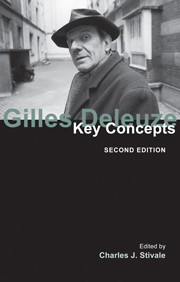Book contents
- Frontmatter
- Contents
- Contributors
- Acknowledgements
- Abbreviations
- Introduction: Gilles Deleuze, a life in friendship
- PART I PHILOSOPHIES
- PART II ENCOUNTERS
- 5 Sense, series
- 6 Event
- 7 Assemblage
- 8 Micropolitics
- 9 Becoming-woman
- 10 The minor
- 11 Style, stutter
- 12 The logic of sensation
- 13 Cinema
- Part III FOLDS
- Chronology
- Bibliography
- Index
11 - Style, stutter
from PART II - ENCOUNTERS
- Frontmatter
- Contents
- Contributors
- Acknowledgements
- Abbreviations
- Introduction: Gilles Deleuze, a life in friendship
- PART I PHILOSOPHIES
- PART II ENCOUNTERS
- 5 Sense, series
- 6 Event
- 7 Assemblage
- 8 Micropolitics
- 9 Becoming-woman
- 10 The minor
- 11 Style, stutter
- 12 The logic of sensation
- 13 Cinema
- Part III FOLDS
- Chronology
- Bibliography
- Index
Summary
Gilles Deleuze's concepts of “style and stutter” are best contextualized through the premise that meaning is not simply given by or found in the world around us, but rather is produced by symbolizing systems in a cultural and political structure. In that sense, Deleuze's poststructuralist project can be said to be anti-representational, highlighting incessantly how language creates reality in complex and open-ended processes of both order and indeterminacy. Deleuze's theory can also be characterized as oppositional in that Deleuze focuses on the indeterminate dimension of language to critique and alter oppressive mechanisms of control. To that end, Deleuze creates an extraordinary range of concepts both to uncover conventional signification and to propose new conceptual possibilities. The concepts style and stutter directly attend to normative systems of linguistic conventions and articulate ways of resisting such systems by creating lines of (linguistic, cultural–political) rupture and escape. This articulation occurs in Deleuze's work both at an explanatory and experiential level; Deleuze's writing itself thus presents eclectic and complex lines of creation and escape.
Deleuze's style and stutter concepts centre on discussions of literature, although he also applies them to music, cinema, the arts and signifying systems in general. Crucial to this approach is Deleuze's understanding of language. He conceptualizes language (like other systems of signification) as being part of an “assemblage”, the heterogeneous, contingent and complex arrangements of practices, bodies and formations with their particular, changing relations of movement and rest.
- Type
- Chapter
- Information
- Gilles DeleuzeKey Concepts, pp. 142 - 152Publisher: Acumen PublishingPrint publication year: 2011

